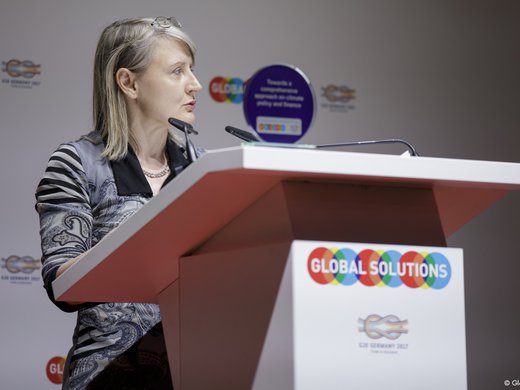If not for Angela Merkel, there would be little reason to expect much from the upcoming Group of Twenty (G20) summit. Germany’s highly capable chancellor is hosting the summit, and she will no doubt be feeling pressure to put on a good show ahead of national elections later this year. Maybe she will succeed where so many others have failed in recent years, and orchestrate something noteworthy in Hamburg on July 7-8.
We can hope — but we would be fools to expect it.
The recent history of the G20 is a story of disappointment and shattered expectations.
This grouping looked as if it would accomplish so much after the first leaders’ summit in 2008. But this assembly of the world’s most powerful men and women have lately only been able to muddle along, missing numerous opportunities to make a difference. In March, finance ministers and central bank governors couldn't muster the courage to stand up to the United States and reaffirm the G20’s resolve to stand against protectionism. A month later, their diffidence infected the IMF's steering committee. US President Donald Trump can’t get legislation passed in Washington, but he’s been effective at bending the G20 to his will.
If the drift continues, it will be time to admit that the G20 isn’t working as a leaders’ forum. There is no will to achieve meaningful change. Remember the Brisbane pledge of 2014, when leaders promised to implement more than 1,000 individual measures that they said would raise global GPD by two percent by 2018? People have mostly stopped talking about it, because it’s not going to happen. The G20 appointed the International Monetary Fund and the Organisation for Economic Co-operation and Development to monitor its commitment to raising the GDP, but the public scrutiny made no difference. The G20’s singular accomplishment as a gathering of leaders remains its assault on the financial crisis. That was eight years ago.
Confidence in the G20 has waned noticeably, even among its most prominent members.
The United States, Germany, Japan, the United Kingdom, France, Italy and Canada are putting renewed emphasis on the Group of Seven (G7), a club that could have vanished after the G20 was elevated to the leaders’ level in 2009. Brazil, Russia, India, China and South Africa are busy setting up international institutions under the BRICS banner.
The revival of the G7 and the steady evolution of the BRICS into something with staying power exposes the G20’s Achilles heel. There always was a danger that the G20 would prove to be too big to be effective. The response to the financial crisis created hope that the group might thrive on the basis of enlightened self-interest. Instead, the G20 has become a place where its members go to feign action by issuing dozens of pages of verbiage. Lengthy communiqués will do nothing to reverse what The Washington Post columnist David Ignatius calls a “me” moment in global affairs.
“Nobody wants to seem like a chump in Trump world,” Ignatius argued on June 27. “When the leader of the global system proclaims that he won’t be bound by foreign restraints, the spirit becomes infectious.” G20 members Russia and Saudi Arabia are among the countries that are taking full advantage of the cover Trump provides, according to Ignatius.
And now, the inevitable calls for a downsizing are beginning.
Mulford, a former US Treasury under secretary for international affairs who also served as his country’s ambassador to India, in February called for the creation of a “G5” consisting of the United States, China, the European Union, Japan and the United Kingdom. One of the reasons he gave was the failure of the “bureaucratic G20” to deal effectively with the fissures in the global financial system. Mulford argued that an overhaul of international governance would be a way for Trump to make a lasting mark on international affairs.
“President Trump needs a plan that can bring key players together to begin reforming the world’s monetary system, which has fallen into something of a bureaucratic morass,” said Mulford, now a visiting distinguished fellow at the Hoover Institution.
“Today, it is dominated by central banks and large, awkwardly formed groups and committees focused on process and regulation. If President Trump were to take the lead in revitalizing a small group of leading economic and monetary powers, this would enable the United States as the world’s leading reserve currency country to lay the basis for future policy actions that ensure U.S. leadership in world economic and financial affairs.”
Mulford’s words should worry the G20’s supporters. He and the Hoover Institution have deep connections with the Republican Party; there is every reason to think his advice could find its way to Trump’s desk. And blowing up one of the globalists’ favourite gathering places might appeal to the president, based on his campaign rhetoric and his behaviour to date as president. The man who pulled the United States out of the Paris climate agreement would have little hesitation walking away from the G20.
And that is probably all that would be required to take out the G20’s foundations. The group was created in the late 1990s as a club for finance ministers and central bankers because the United States liked the idea. It became a leaders’ forum because the US president decided to make it one.
The current president could just as easily undercut the G20 by quitting the summits. The gatherings would quickly lose their allure without the leader of the world’s biggest economy and biggest army on-site to lobby and consult. Before 2008, the G20 was a secondary pillar of global governance. Finance ministers and central bank leaders tended to send their deputies to the meetings. The G20 could easily return to that status. All it would take is for a couple of leaders to decide they could no longer be bothered.
At this “me” moment in global history, that doesn’t seem like such a wild possibility. Hamburg better deliver.



